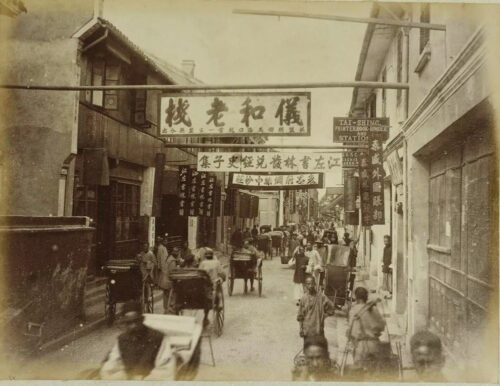‘B for Busy’ challenges the male gaze, wins Chinese audiences
Shao Yihui's romantic comedy set in idealized Shanghai was the highest-rated movie in 2021 on Douban.

The romantic comedy B for Busy (爱情神话 àiqíng shénhuà) was released last December, and it took only a few days for it to become the highest-rated Chinese movie of 2021 on Douban, China’s IMDb. The unexpected success of the film lies in the fresh perspective of emergent director Shào Yìhuī 邵艺辉 on middle-age romance and her in-depth development of female characters.
Set in Shanghai’s former French Concession, B for Busy tells the story of Lao Bai (played by Xú Zhēng 徐峥), a divorced kind-hearted painter, and three women who at first seem to be competing for his romantic attention, but eventually become his friends and even allies. Ms. Li (Mǎ Yīlí 马伊琍) is the single mother of British-Chinese Maya (Féng Mǎyà 冯玛娅) and works long hours in the advertising industry to make ends meet. Gloria (Ní Hóngjié 倪虹洁) regularly attends painting classes in Lao Bai’s courtyard and is an energetic, confident woman. Her Taiwanese husband goes missing while conducting business in Turkey, leaving her plenty of time to flirt with Lao Bai. When asked whether the kidnappers called her for ransom, she simply replies, “Well, if they do, I’ll tell them to kill him.” The last female character to be introduced is Lao Bai’s ex-wife, Beibei (Wú Yuè 吴越), the most conservative of the trio, who often quarrels with Lao Bai about their son’s upbringing.
In a comedic sequence, the three women arrive at Lao Bai’s apartment together, spoiling what was meant to be a date between him and Ms. Li. It is only when Lao Bai’s good friend and nosy neighbor Lao Wu (Zhōu Yěmáng 周野芒) jumps in that the dinner turns into a humorous feast, and one of the most significant dialogues of the film unravels. Addressing childless Gloria, Beibei states, “A woman’s life is not complete until she has children,” stirring an escalation of sarcasm from Gloria and Ms. Li, and resulting in Lao Bai toasting: “A woman’s life is not complete until she has rebelled.” This exchange not only legitimizes different perspectives on childbearing, but also shows how Lao Bai steers away from the stereotype of the overconfident average man — 普信男 pǔ xìnnán — a term popularized by controversial stand-up comedian Yáng Lì 杨笠.
A second conversation between Gloria and Ms. Li pushes the boundaries of female empowerment even further, and allegedly angered some male moviegoers in northern China, to the point they left halfway through the screening. In a witty meta-critique of the male gaze in traditional romance narratives, the two leads discuss a play they saw together. “That’s the problem with male writers,” Ms. Li says. “To them, there are only two kinds of women: sluts and virgins.” Lao Bai then says, “I feel ashamed for all the male Chinese directors.”
Through the storyline of Lao Bai’s son, Bai Ge (黄明昊 Huáng Mínghào), who comes out as gay during an arranged date, the film offers a heartwarming perspective on young LGBTQ+ Chinese. Although at first Lao Bai scolds him for plucking his eyebrows, he eventually warms up to Bai Ge’s “feminine” traits.
The whole movie being in Shanghainese dialect helps showcase the comedic skills of the cast. However, the inclusion of foreign characters feels superficial. Alexander (Hamzah Mohamed Nagi Al-salami), a twentysomething Italian guy, lives rent-free in Lao Bai’s apartment and, according to an interview with Shao Yihui, “shows that not all foreigners in Shanghai are outstanding.” Unfortunately, we don’t see any outstanding foreign characters in the film. Maya’s British father is only mentioned as a “scumbag” and never appears on screen. Besides the unfortunate choice of casting an Iranian actor to play an Italian, the depiction of foreigners in Shanghai as lazy only made my experience of being the only foreigner — an Italian, no less — sitting in a theater crammed with Shanghainese highly uncomfortable.
The Chinese title of the movie, which translates to Myth of Love, suggests the film is supposed to feel more like a fairytale, filled with middle-class artists in three-story historical buildings, than an accurate portrayal of Shanghai. Still, the film is entertaining, and gives us a version of Shanghai we want, in the same way Woody Allen’s movies make us dream about an imagined bourgeois New York.
B for Busy is one of the better commercial movies made in China in the last few years. It deserves praise for its thought-provoking depiction of women and middle-age romance, and leaves me longing for more films by up-and-coming female directors.







